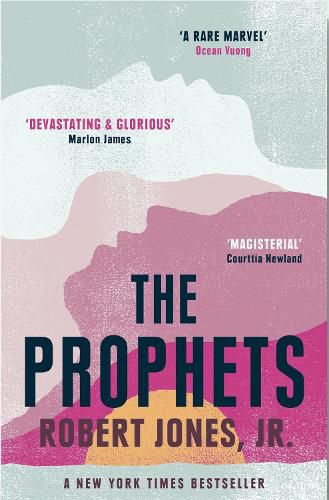Readings Newsletter
Become a Readings Member to make your shopping experience even easier.
Sign in or sign up for free!
You’re not far away from qualifying for FREE standard shipping within Australia
You’ve qualified for FREE standard shipping within Australia
The cart is loading…






In this blinding debut, Robert Jones Jr. blends the lyricism of Toni Morrison with the vivid prose of Zora Neale Hurston to characterise the forceful, enduring bond of love, and what happens when brutality threatens the purest form of serenity.
The Halifax plantation is known as Empty by the slaves who work it under the pitiless gaze of its overseers and its owner, Massa Paul. Two young enslaved men, Samuel and Isaiah dwell among the animals they keep in the barn, helping out in the fields when their day is done. But the barn is their haven, a space of radiance and love - away from the blistering sun and the cruelty of the toubabs - where they can be alone together.
But, Amos - a fellow slave - has begun to direct suspicion towards the two men and their refusal to bend. Their flickering glances, unspoken words and wilful intention, revealing a truth that threatens to rock the stability of the plantation. And preaching the words of Massa Paul’s gospel, he betrays them.
The culminating pages summon a choral voice of those who have suffered in silence, with blistering humanity, as the day of reckoning arrives at the Halifax plantation. Love, in all its permutations, is the discovery at the heart of Robert Jones Jr’s breathtaking debut, The Prophets.
$9.00 standard shipping within Australia
FREE standard shipping within Australia for orders over $100.00
Express & International shipping calculated at checkout
In this blinding debut, Robert Jones Jr. blends the lyricism of Toni Morrison with the vivid prose of Zora Neale Hurston to characterise the forceful, enduring bond of love, and what happens when brutality threatens the purest form of serenity.
The Halifax plantation is known as Empty by the slaves who work it under the pitiless gaze of its overseers and its owner, Massa Paul. Two young enslaved men, Samuel and Isaiah dwell among the animals they keep in the barn, helping out in the fields when their day is done. But the barn is their haven, a space of radiance and love - away from the blistering sun and the cruelty of the toubabs - where they can be alone together.
But, Amos - a fellow slave - has begun to direct suspicion towards the two men and their refusal to bend. Their flickering glances, unspoken words and wilful intention, revealing a truth that threatens to rock the stability of the plantation. And preaching the words of Massa Paul’s gospel, he betrays them.
The culminating pages summon a choral voice of those who have suffered in silence, with blistering humanity, as the day of reckoning arrives at the Halifax plantation. Love, in all its permutations, is the discovery at the heart of Robert Jones Jr’s breathtaking debut, The Prophets.
Though we’re only at the start of 2021, Robert Jones Jr.’s debut The Prophets already feels like one of the big books of the year. Set on an antebellum plantation in the deep south of Mississippi, The Prophets is Jones’s answer to the question: ‘did Black, queer people exist in the distant past?’ The answer is of course they did, and in this exquisite imagining, he explores what that existence could have been like.
The novel is told from the perspectives of several characters, principally Isiah and Samuel, two young enslaved men whose relationship grants them an almost Edenic sweetness against the daily terrors of slavery. Their love is a quiet rebellion, a deliberate choice in which they can, however briefly, escape the physical and spiritual deprivation the White slave owners inflict on them.
How Isiah and Samuel’s relationship unfolds is seen through the eyes of a sprawling cast, including the other slaves on the plantation, who respond in different ways to this relationship in their midst. One of them, Amos, has newly found Christianity and sees Isiah and Samuel as people to be saved. The slave owners also get their own point-of-view chapters, and their careless cruelty is chilling; you’re constantly tense with dread at what their every capricious whim could mean for the people they control. Readers should be aware that Jones’s writing, while rich with feeling and metaphor, is unflinching at cataloguing the dehumanising effects of slavery. Jones has described the writing of his novel as an act of witnessing, and no matter what your knowledge of this era is, witnessing the reality of slavery through fiction – an empathetic medium – is by necessity hard.
However, Jones also finds power in the small details. Every act of tenderness and care, every decision people choose for themselves is magnified. And there are moments of beauty and defiance in the novel where I felt fiercely elated. The Prophets feels like Jones’s attempt to reach across history, to create a link in a narrative of love and resistance led by Black queer people and Black women. This is an ever-shifting, polyphonic epic that leaves you shaking with rage, love and a desire for justice and freedom. It is an astonishing achievement that lives up to the enormity of its subject matter.
Travel to Ancient Greece to Renaissance Italy to the trenches of war, with these incredible historical reads.